A diverse L.A. suburb finds love and songs of celebration in ‘Crazy Ex-Girlfriend’
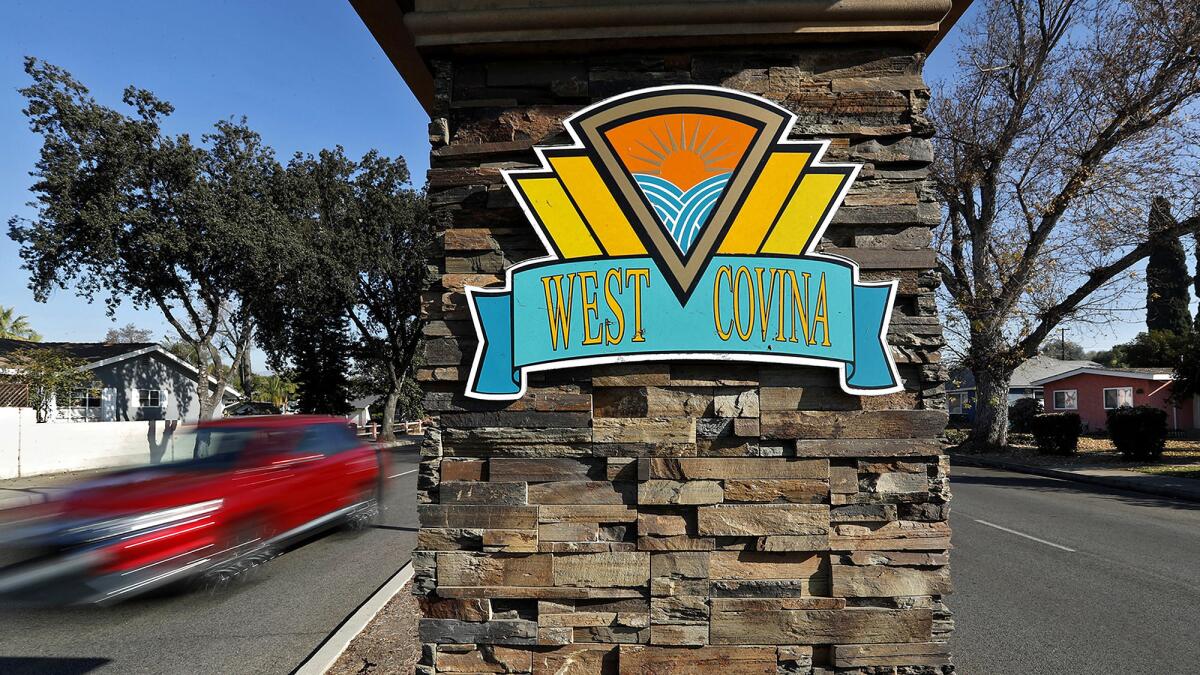
- Share via
Decades ago, with hotel construction on the rise, the Historical Society of West Covina formed a tourism committee to explore the idea of turning their town into a local draw.
On a brochure, society members cheerfully listed their community’s hottest attractions: a Japanese community center, the historic Hurst Ranch, a playhouse and a large baseball field complex.
For the record:
11:20 a.m. Jan. 8, 2018An earlier version of this article described West Covina as the hometown of the main character of “Crazy Ex-Girlfriend.” It is the hometown of her love interest.
They placed the brochures at hotels next to glossy pamphlets advertising Disneyland, Venice Beach ziplining and tours of celebrity homes in the Hollywood Hills.
A few weeks later, they checked the stands. All of the West Covina brochures were still there.
That was the end of the tourism board, said Miriam Tennant, president of the historical society.
But anonymity — and the privacy and tranquility that accompany it — has always been a part of West Covina’s appeal.
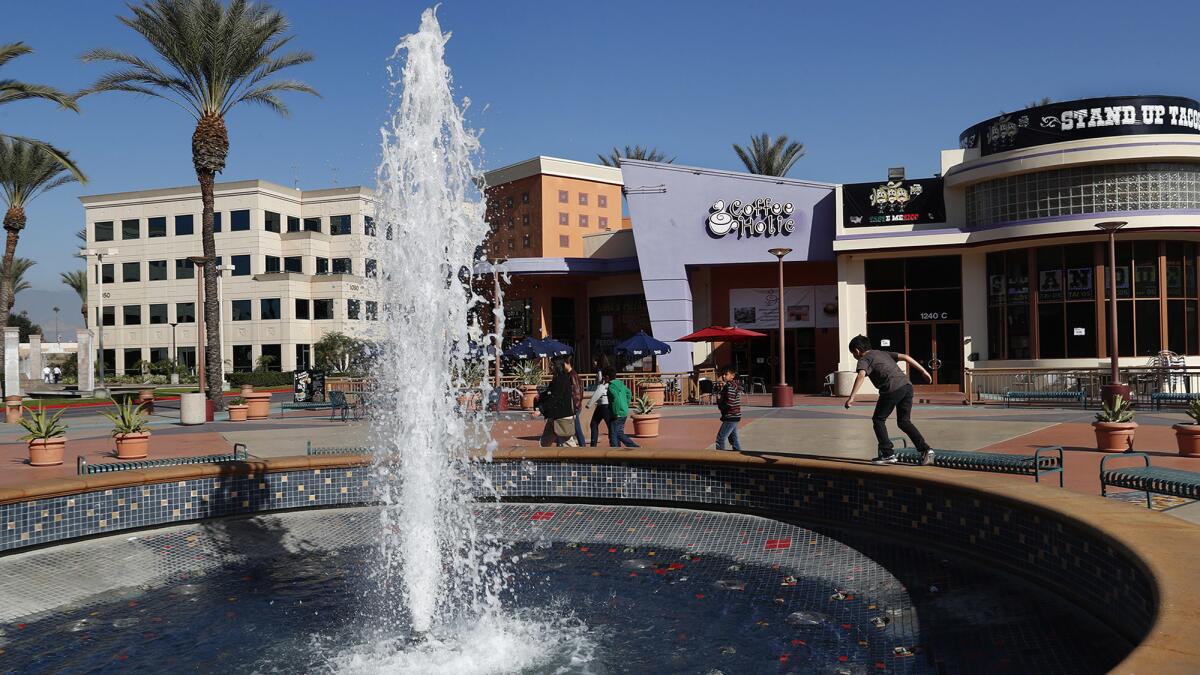
And the suburb’s ordinariness — unlikely to charm or offend — is part of what drew the creators of the CW show “Crazy Ex-Girlfriend” to choose the city as the setting for their show, which follows the antics of a high-powered attorney who moves from New York to West Covina to rekindle a childhood romance.
Hollywood loves to use Southern California’s swaying palm trees and beaches in movies and TV, but it often fails to capture the nuance of its geography or the diversity of the county’s 88 cities. And West Covina, one of the more lesser-known municipalities in the county, has rarely, if ever, been the setting for a television show.
But “Crazy Ex-Girlfriend” has been welcomed by some West Covinans, who say it portrays the cheery banality and casual diversity of life in Southern California’s suburbs. Many of the show’s events take place at a boba tea shop, a common stop for San Gabriel Valley residents. The show’s romantic interest is a Filipino character played by a Filipino American actor, reflecting the long-standing Filipino community in West Covina.
The show creators Rachel Bloom and Aline Brosh McKenna said they wanted to try to recast the American small town in the image of the Southern California suburb, a version of small-town life that’s rarely portrayed.
“Aline and I liked the idea of West Covina being a symbol for what America now is: A diverse group from all walks of life going to the same chain stores and restaurants,” Bloom said.
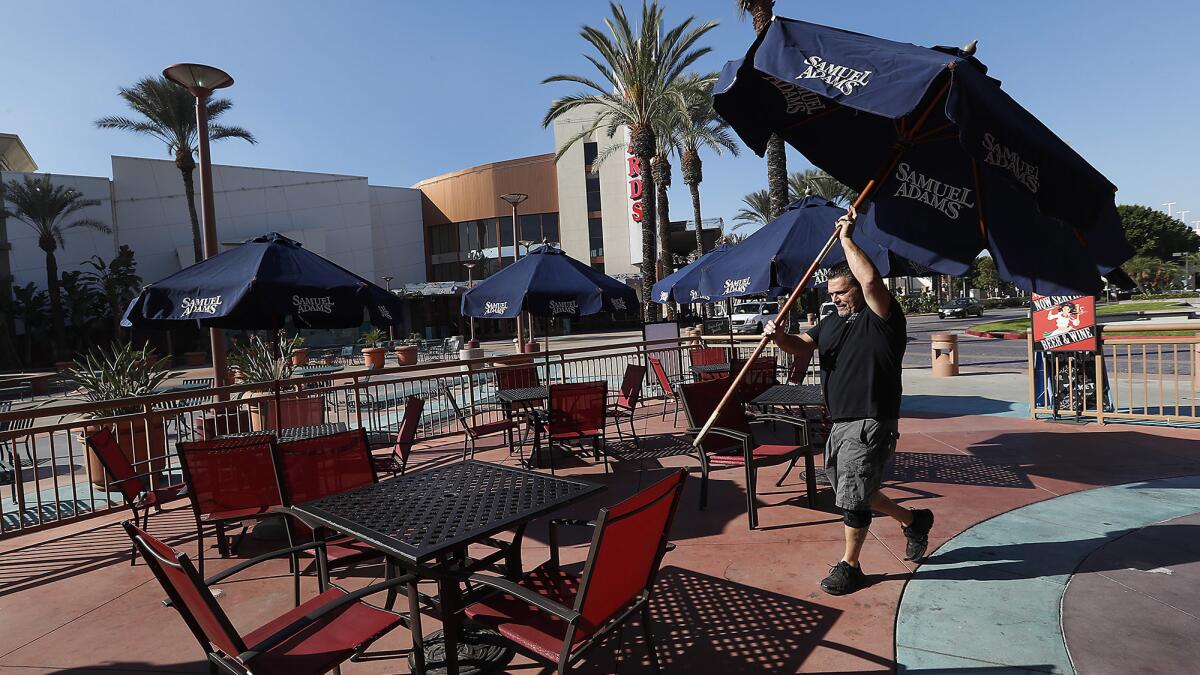
West Covina boasts a long but largely vanilla history.
It began as a small, agrarian community that incorporated in 1923 to prevent the neighboring city of Covina from locating a sewage farm within West Covina’s borders. A newspaper editorial from 1909 laid out the weighty ambitions of the incorporation campaign.
“From down in Walnut Center, where the corn hides from sight the tops of five year old walnut trees, where the barley leaps like magic under irrigation … comes an agitation for … a name that will definitely place it in the minds of the people of Southern California.”
The few times the spotlight has landed on West Covina, it hasn’t always been for the best reasons, Tennant said.
The city made national headlines in 1959 because of the lurid case of Dr. Bernard Finch and his assistant Carole Tregoff, who were charged with killing Finch’s wife.
National attention came again in 1977, when a pet chimpanzee named Moe bit a woman’s finger and the city unsuccessfully sued to have him removed. Moe put West Covina in the limelight again in 1998, when he seriously injured the hand of a West Covina police officer trying to capture him and dented several police cruisers.
Gloria Allred later represented the pet owner, race car driver St. James Davis, in a lawsuit to allow Davis to keep the chimpanzee.
In the 1980s, West Covina made the news for hosting one of the nation’s largest and most active toxic waste dumps.
And most recently, the city went viral last year when a dead frog was discovered in a salad at BJ’s Restaurant and Brewhouse.
So when “Crazy Ex-Girlfriend” cameras showed up in West Covina, some residents were wary.
“You never know how they’re going to represent your city. But I was pleasantly surprised,” said Henry Torres, who has lived in West Covina for 24 years.
Fans of “Crazy Ex-Girlfriend” who live in West Covina said the show tries to reflect the city as an actual place.
Still, it gets some details wrong.
For example, a musical number titled “West Covina” jokingly but incorrectly calls the city “the pride of the Inland Empire.”
But in 2016, the City Council named Oct. 21 — the date of the second season’s premiere — “Crazy Ex-Girlfriend Day” in West Covina. The council even presented the show runners with a key to the city that now hangs in a common space for the writer’s room, a reminder that the show they’re writing depicts a real place, Bloom said.
Bloom, the show’s co-creator and star, grew up in Manhattan Beach. Her only experiences of the San Gabriel Valley were in Glendora, where her high school crush lived. Every time she’d drive on the 10 Freeway east, she’d get butterflies going past his exit.
“This idea of Glendora having a romantic mystique partially inspired the choice of West Covina,” Bloom said.
The show is unusual among portrayals of Los Angeles in film and television, which often exclude or fictionalize the city’s geography in favor of convenience, efficiency or marketability, said Thom Andersen, creator of the film “Los Angeles Plays Itself,” which critiques Hollywood’s portrayals of the city.
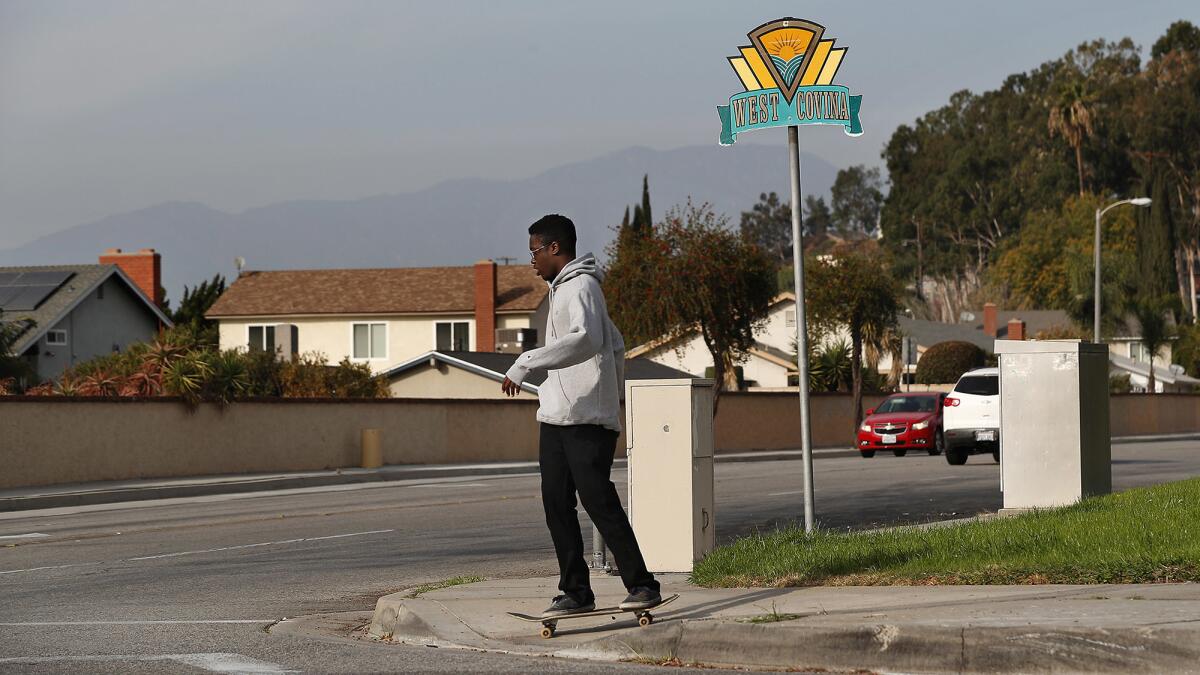
Because it was cheaper to shoot in Los Angeles, the city was commonly used as a stand-in for other locales. Filmmakers often showed only the aspirational parts of life in Los Angeles: Hollywood, swaying palm trees, beaches and the Sunset Strip, said UCLA School of Theater, Film and Television professor Tom Nunan, who was one of the producers of the film “Crash.”
But now that tax incentives for filmmakers are better elsewhere and it’s more expensive to shoot in Los Angeles, the city is starting to appear in film and television as itself, Nunan said.
“I think in TV, there’s a huge opportunity to reimagine portrayals and experiences of Los Angeles,” Nunan said.
At a recent “Crazy Ex-Girlfriend” viewing party, City Councilman James Toma, a big fan of the show, led a group of about 50 in a show-specific trivia game.
“Crazy Ex-Girlfriend” posters signed by Bloom were given out as prizes to those who could recall all the times when West Covina was mentioned. There were raucous cheers for shots of anonymous office buildings that happened to be nearby and applause when the city’s name was mentioned.
Lisa Mayo, a resident of the city for more than 37 years, said intentionally or not, the show has brought awareness to West Covina. When she was first moving here, all she knew was that it was “past Pasadena.”
“I can name-drop my city now,” Mayo said.
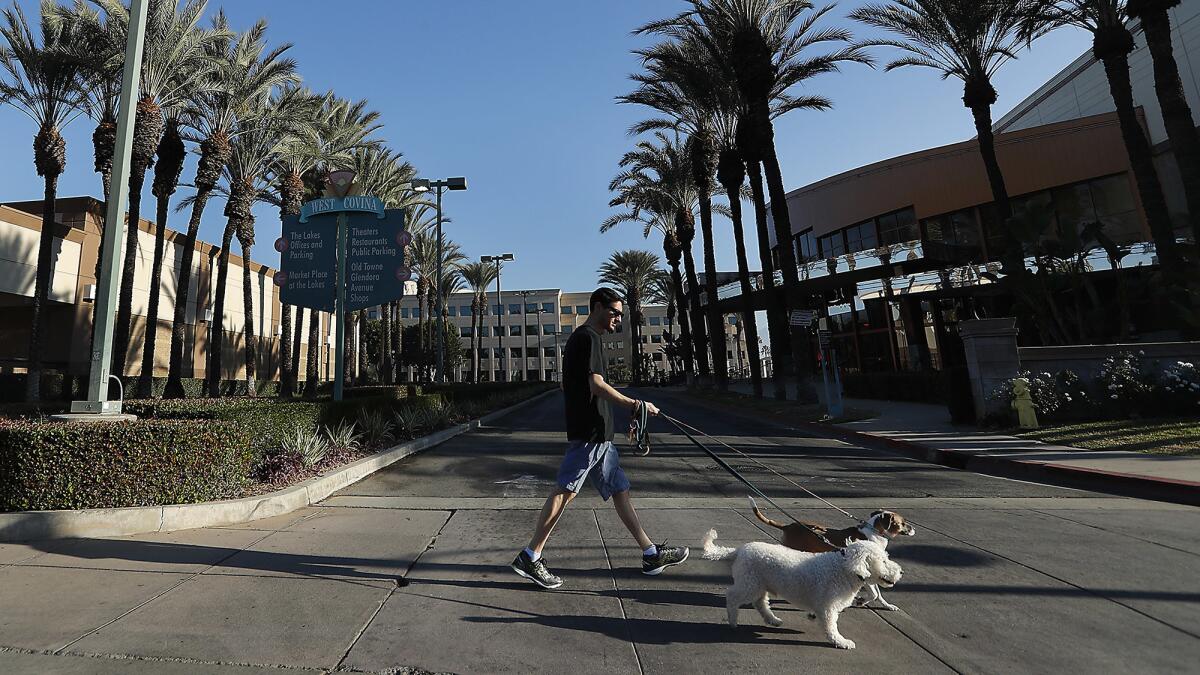
Ironically, tourists who find themselves in West Covina nowadays could have more attractions to visit than ever. The city recently approved a $12-million plan to create a walkable downtown area with bigger sidewalks and greenery. The Filipino community is also petitioning the city to designate a Little Manila neighborhood.
The show, which is mostly shot on a studio lot, hasn’t generated much film permit revenue for West Covina — less than $28,000 over three shoots. And there’s no “Crazy Ex-Girlfriend”-associated tourism revenue that anyone is aware of, Toma said, although he can’t discount it as a possibility.
But the attention brought by the show has had one perceptible impact.
As a boy, former City Councilman Ben Wong rarely told people from out of town that he was from West Covina because he assumed they wouldn’t know where it was. But the show — even though he doesn’t watch it — has changed that.
“Nowadays, I think I’d tell people, ‘I’m from West Covina,’” Wong said.
Twitter: @frankshyong
More to Read
Sign up for Essential California
The most important California stories and recommendations in your inbox every morning.
You may occasionally receive promotional content from the Los Angeles Times.














